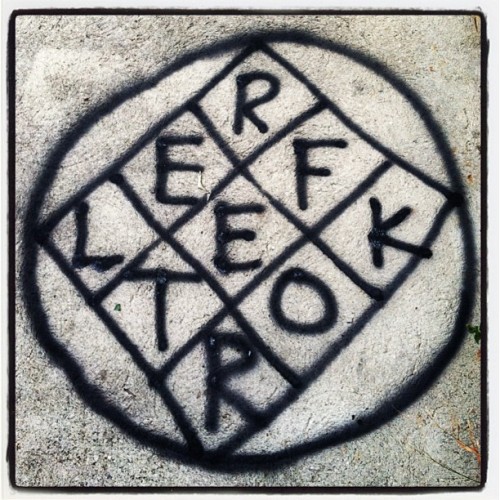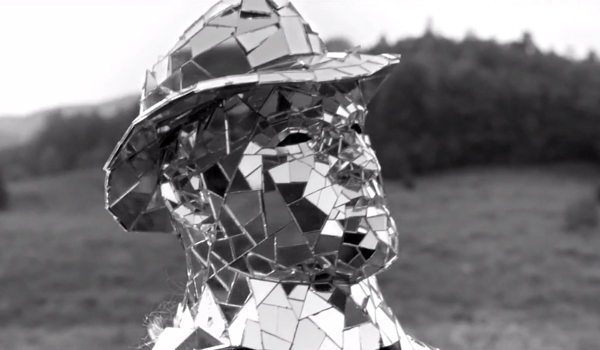
This review comes courtesy of our friend Brooks Tate.
I was late to the Arcade Fire party. A friend gave me their first three albums on a flash drive, and those songs lived on my iPod unnoticed for more than six months. Their songs would appear and reappear, but I didn’t pay much attention. Then I don’t know when, but something happened, and I couldn’t listen to these songs enough. And these weren’t just songs, but albums, with a common thread weaved through the whole. I know I’ve found a band when my favorite song is always on the move. At first it was “Intervention,” and then “No Cars Go,” but that was only until I really listened to “Windowsill,” but oh my god how had I ignored “Antichrist Television Blues” for so long? And I’m only talking about Neon Bible!
While liking Arcade Fire, or even knowing about Arcade Fire in my circles, is considered a hipster-kind-of-cool, I’ve found that my gushing over this band tends to be geeky. In spite of this, it is time to gush over their new record Reflektor released last week. As in all their albums, even a dozen listens can only just begin to tap into what’s there.
Let’s begin with AF’s signature-style parenthetical-titling of their tracks. In this record it’s “Awful Sound (Oh Eurydice),” and “It’s Never Over (Hey Orpheus).” This album’s cover art is a photograph of Rodin’s marble sculpture Orpheus and Eurydice, where Orpheus covers his eyes with his left hand, while Eurydice behind him, head over his right shoulder, drapes her right arm over his. In the tragic myth Orpheus, a musician of such beauty that his song can even make Tantalus forget his thirst, marries Eurydice only to lose her to death right after the wedding. A grieving Orpheus determines to go to the underworld to bring his wife back to the upper world. With his lyre, he calms the three headed guard dog Cerberus and convinces Hades and Persephone to release Eurydice back to life, but she is released on the condition that while Eurydice is following Orpheus on their journey back to the upper world Orpheus does not look back at her. As Orpheus finally makes it into the daylight after their long journey, he turns around only to find that Eurydice has not yet come out of the cave and she vanishes back into the underworld.
 Why Arcade Fire would choose this story as the face of their album is, I’m sure, as layered as their lyrics and music. Are they drawn to Orpheus’s musical gift? Can the band’s male and female voices capture the dialogue between these tragic lovers? While there is certainly more beneath the surface, it’s quick to note in this Greek myth the light/dark motif that AF so often loves to approach. Their previous record The Suburbs rattles about the half-light of our electrified houses, and Reflektor continues the motif in its opening (title) track, “Trapped in a prison/in a prism of light.” The character in these songs is on the hunt for light, for life, for heaven, but what he finds is a dim reflection, a half-light, moonshine. Win Butler phrases this as finding “reflectors” instead of our longed for “connectors.” We are always searching for the connector (the right book, the right job, the right marriage, the right religion), always finding the reflector, and we arrive at the refrain, “If this is heaven, I need something more.”
Why Arcade Fire would choose this story as the face of their album is, I’m sure, as layered as their lyrics and music. Are they drawn to Orpheus’s musical gift? Can the band’s male and female voices capture the dialogue between these tragic lovers? While there is certainly more beneath the surface, it’s quick to note in this Greek myth the light/dark motif that AF so often loves to approach. Their previous record The Suburbs rattles about the half-light of our electrified houses, and Reflektor continues the motif in its opening (title) track, “Trapped in a prison/in a prism of light.” The character in these songs is on the hunt for light, for life, for heaven, but what he finds is a dim reflection, a half-light, moonshine. Win Butler phrases this as finding “reflectors” instead of our longed for “connectors.” We are always searching for the connector (the right book, the right job, the right marriage, the right religion), always finding the reflector, and we arrive at the refrain, “If this is heaven, I need something more.”
In two Rolling Stones pieces by Patrick Doyle and Josh Eells, Win Butler talks about the influence of Kierkegaard in this album. In 1846, Kierkegaard wrote about an essay, “The Present Age,” in which he defines the present as a reflective age and not a revolutionary age. Kierkegaard writes, “The present age is one of understanding, of reflection, devoid of passion, an age which flies into enthusiasm for a moment only to decline back into indolence.” That’s saying that we prefer making decisions over taking actions. We have reasons, not passions. Kierkegaard says more, “The present age is an age of advertisement, or an age of publicity: nothing happens, but there is instant publicity about it.” Um, hello, modern world of twitter, the weather channel, newsfeeds, CNN, ESPN. In Eells piece, Butler’s wife and accompanist in the band, Regine Chassagne, remarks how Kierkegaard’s 19th century observations have only become more poignant in the 21st century, “It’s really resonant to now, but it’s from like 1840-something. It’s like, dude, you have no fucking idea how gnarly it’s gonna get.”
[youtube=http://www.youtube.com/watch?v=7E0fVfectDo&w=600]
Walker Percy, 20th century Southern writer and Kierkegaard devotee, would agree that in our age, a reflective age, we know more about everything but just as little about ourselves. Never before have we known more about the stars and the planets, the human body and human society, technology and biology. Even still, we ourselves were and are and will continue to be a mystery. Though we can fit everything under our scientific light, when it comes to us, we seem to be in the dark, and the lights by which we so often see often turn out to be only half-lights. Our microscopes seem to break when we turn them around on ourselves. To this predicament, Kierkegaard, Percy, and Arcade Fire speak. They want to relieve the excessive pressure we put on the leg of reason and science. They call us to remember the helpful and irreplaceable legs of gut feelings, emotions, and religion.
Since I don’t know Butler or the band’s religious convictions, it would be unfair–and improbable–to say these songs are setting out to support any Christian claims, but the lyrics, as always, do reveal Butler’s familiarity with the books of the Bible. In “We Exist,” he belts, “Not the first one betrayed by a kiss.” (The band even famously bought an abandoned church to record their second album.) Whether or not the singer is, the songs are religious, even when or especially when they shout against faith. They are religious in the sense that they launch from a point of discontent in the world, and go on a search for that something more. In listening to Arcade Fire, you can be simultaneously drawn to and repelled from the church, maybe in as much as you Jesus as another wrong thing in the world or as the narrow way to that something else.
Since I have the floor, I’ll finish by saying my favorite tracks are the triumvirate of “It’s Never Over (Hey Orpheus),” “Porno,” and “Afterlife.” When the “Hey Orpheus” beat kicks in, I have to stop what I’m doing for that fifteen minutes and just take it in. Arcade Fire has a remarkable talent in rolling one song into another so that removing any song from the whole of the album drains from the overall enjoyment. Arcade Fire may be the last reason not to buy $0.99 songs on iTunes. I’ve also heard favorite votes for the title-track “Reflektor,” “We Exist,” and “Joan of Arc.”
This can only be the tip of the iceberg. My love for each Arcade Fire album has only grown with time. There are mountains beyond mountains here to explore. So give it a listen, or twenty.
[youtube=http://www.youtube.com/watch?v=r75BFcH4u2k&w=600]

COMMENTS
2 responses to “New Music: Arcade Fire’s Reflektor”
Leave a Reply














Seems like I remember hearing that Win was Mormon, and I know I read that he studied theology at McGill.
“Arcade Fire may be the last reason not to buy $0.99 songs on iTunes.” You could almost apply that line of reasoning to their albums, as each one develops upon previous themes. What would “Reflektor” be without “Neon Bible” and “Suburbs”?